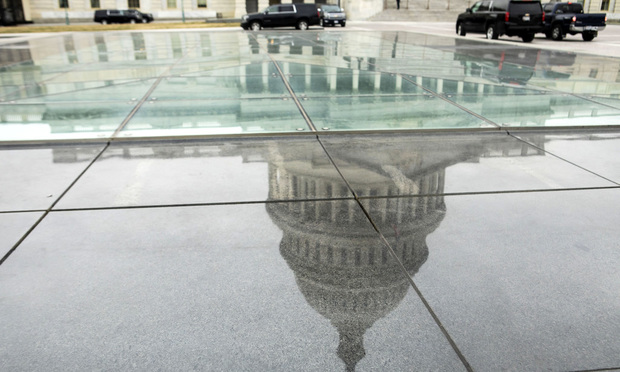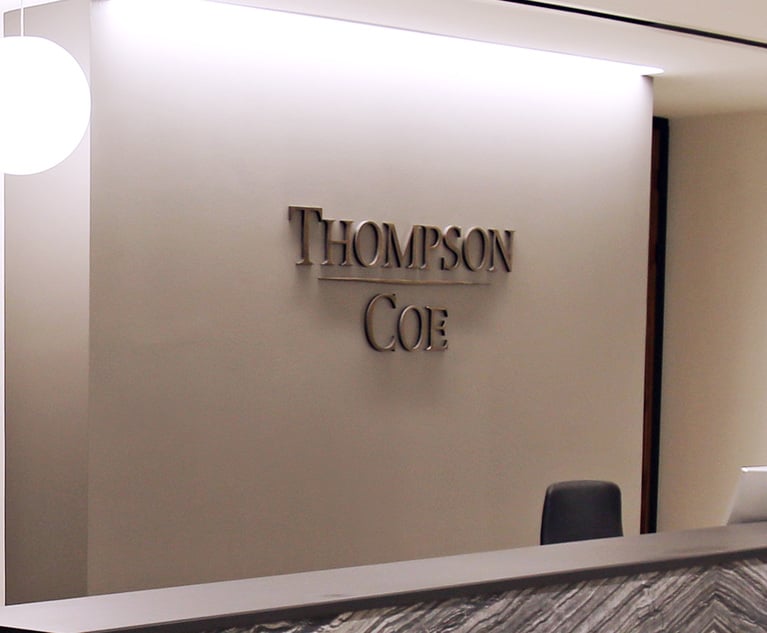Ethics Opinion Outlines Obligations When a Lawyer Is Mentally Impaired
The D.C. Bar opinion clarifies how law firms and government agencies should respond when they believe one of their lawyers may be impaired.
October 23, 2019 at 03:43 PM
5 minute read
 The U.S. Capitol Rotunda is reflected outside in Washington, D.C., on Feb. 27, 2019. (Photo: Diego M. Radzinschi/ALM)
The U.S. Capitol Rotunda is reflected outside in Washington, D.C., on Feb. 27, 2019. (Photo: Diego M. Radzinschi/ALM)
The District of Columbia Bar this month released an ethics opinion in which it examined the role lawyers and office staff should play when they believe an attorney colleague in their law firm or government agency may be mentally impaired.
In the opinion, the D.C. Legal Ethics Committee sought to clarify when attorneys' impairments may or may not trigger mandatory reporting obligations. The opinion also sets out guidelines for when supervising attorneys and colleagues should address seemingly impaired behavior, short of mandatory reporting.
The committee addressed only mental impairment, which it described as a "chronic or temporary condition arising out of or related to age, substance abuse, a physical or mental health condition or other circumstance affecting the lawyer."
The opinion noted that impaired lawyers have the same obligation as other attorneys, as stated in the American Bar Association's Formal Opinion 03-429: "Simply stated, mental impairment does not lessen a lawyer's obligation to provide clients with competent representation." However, since impaired lawyers may be unaware or in denial of their impairment, the committee sought to clarify the duties of managers and colleagues.
The bar addressed three scenarios: what partners and partners-in-charge should do when they believe an attorney they work with may suffer from an impairment that hinders their ability to best serve clients; when attorneys with impairment should be reported for violation of bar rules; and how an attorney's former firm should disclose his or her impairment to a new firm.
When partners and managers believe that an attorney may be impaired, they have an obligation to make a "reasonable" effort to ensure that all attorneys at a firm or in a government office meet the Rules of Professional Conduct. The committee said what qualifies as "reasonable," however, will differ depending on an organization's size, structure and practice focus. For example, not every firm may need to have a written policy in place to address impairment issues, but firms should be fostering a culture that promotes self-reporting of impairment, guided by their ultimate ethical obligations toward clients.
The committee also adopted a four-part test to determine when firms are obliged to report that an attorney is impaired:
- The reporting lawyer has actual knowledge of the violation.
- Reporting can be accomplished without disclosure of client confidences or secrets.
- The violation involves a disciplinary rule.
- The violation raises a substantial question as to honesty, trustworthiness or fitness to practice law.
If these standards are met, then reporting is mandatory. However, the committee pointed out that even if these standards are not met and a report cannot be made, firms may encourage an attorney to seek assistance from the D.C. Bar Lawyer Assistance Program.
Finally, the committee addressed what ethical obligations a firm has when an impaired attorney is moving to a new firm. Firms should be direct with a departing attorney and ask that they not try to solicit the firm's clients, the opinion states; if a departing lawyer with an impairment will solicit clients to join his or her new firm, his or her former firm may have an obligation to disclose the impairment to the clients, regardless of other steps the firm is taking to mitigate potential damage. However, the committee cautions against the care a firm must take when speaking to clients, and says the firm must disclose only "necessary and material information" while protecting the impaired lawyer's privacy rights.
The committee also determined that if a departing lawyer joins a new firm without taking clients, and later it is discovered that a former firm client has retained an impaired lawyer, the lawyer's former firm does not have an obligation to disclose this information to clients.
The opinion concluded that tension remained between allowing clients to have the best representation possible by fully disclosing an impairment and protecting the privacy of an attorney with a mental impairment, since some mental impairments considered by the bar would not meet the standards necessary to report a rule violation.
"In circumstances where a law firm or government agency addresses the issue of an impaired lawyer, there is a crucial balancing between protecting the interests of the clients and properly discharging the law firm or government agency's obligations to protect the privacy of the lawyer under substantive law," the opinion said.
While some firms have worked in recent years to reduce stigma surrounding mental health challenges and to support attorneys grappling with substance abuse, The American Lawyer found last year that attorneys with other mental impairments, such as Alzheimer's disease and dementia, delay notifying their firms for fear of retribution, while some firms have removed attorneys suffering from these impairments.
Read More
Minds Over Matters: An Examination of Mental Health in the Legal Profession
Out of Focus: Lawyers and Firms Can No Longer Ignore Dementia
This content has been archived. It is available through our partners, LexisNexis® and Bloomberg Law.
To view this content, please continue to their sites.
Not a Lexis Subscriber?
Subscribe Now
Not a Bloomberg Law Subscriber?
Subscribe Now
NOT FOR REPRINT
© 2025 ALM Global, LLC, All Rights Reserved. Request academic re-use from www.copyright.com. All other uses, submit a request to [email protected]. For more information visit Asset & Logo Licensing.
You Might Like
View All
KPMG Wants to Provide Legal Services in the US. Now All Eyes Are on Their Big Four Peers



K&L Gates Sheds Space, but Will Stay in Flagship Pittsburgh Office After Lease Renewal
Trending Stories
- 1'It's Not Going to Be Pretty': PayPal, Capital One Face Novel Class Actions Over 'Poaching' Commissions Owed Influencers
- 211th Circuit Rejects Trump's Emergency Request as DOJ Prepares to Release Special Counsel's Final Report
- 3Supreme Court Takes Up Challenge to ACA Task Force
- 4'Tragedy of Unspeakable Proportions:' Could Edison, DWP, Face Lawsuits Over LA Wildfires?
- 5Meta Pulls Plug on DEI Programs
Who Got The Work
Michael G. Bongiorno, Andrew Scott Dulberg and Elizabeth E. Driscoll from Wilmer Cutler Pickering Hale and Dorr have stepped in to represent Symbotic Inc., an A.I.-enabled technology platform that focuses on increasing supply chain efficiency, and other defendants in a pending shareholder derivative lawsuit. The case, filed Oct. 2 in Massachusetts District Court by the Brown Law Firm on behalf of Stephen Austen, accuses certain officers and directors of misleading investors in regard to Symbotic's potential for margin growth by failing to disclose that the company was not equipped to timely deploy its systems or manage expenses through project delays. The case, assigned to U.S. District Judge Nathaniel M. Gorton, is 1:24-cv-12522, Austen v. Cohen et al.
Who Got The Work
Edmund Polubinski and Marie Killmond of Davis Polk & Wardwell have entered appearances for data platform software development company MongoDB and other defendants in a pending shareholder derivative lawsuit. The action, filed Oct. 7 in New York Southern District Court by the Brown Law Firm, accuses the company's directors and/or officers of falsely expressing confidence in the company’s restructuring of its sales incentive plan and downplaying the severity of decreases in its upfront commitments. The case is 1:24-cv-07594, Roy v. Ittycheria et al.
Who Got The Work
Amy O. Bruchs and Kurt F. Ellison of Michael Best & Friedrich have entered appearances for Epic Systems Corp. in a pending employment discrimination lawsuit. The suit was filed Sept. 7 in Wisconsin Western District Court by Levine Eisberner LLC and Siri & Glimstad on behalf of a project manager who claims that he was wrongfully terminated after applying for a religious exemption to the defendant's COVID-19 vaccine mandate. The case, assigned to U.S. Magistrate Judge Anita Marie Boor, is 3:24-cv-00630, Secker, Nathan v. Epic Systems Corporation.
Who Got The Work
David X. Sullivan, Thomas J. Finn and Gregory A. Hall from McCarter & English have entered appearances for Sunrun Installation Services in a pending civil rights lawsuit. The complaint was filed Sept. 4 in Connecticut District Court by attorney Robert M. Berke on behalf of former employee George Edward Steins, who was arrested and charged with employing an unregistered home improvement salesperson. The complaint alleges that had Sunrun informed the Connecticut Department of Consumer Protection that the plaintiff's employment had ended in 2017 and that he no longer held Sunrun's home improvement contractor license, he would not have been hit with charges, which were dismissed in May 2024. The case, assigned to U.S. District Judge Jeffrey A. Meyer, is 3:24-cv-01423, Steins v. Sunrun, Inc. et al.
Who Got The Work
Greenberg Traurig shareholder Joshua L. Raskin has entered an appearance for boohoo.com UK Ltd. in a pending patent infringement lawsuit. The suit, filed Sept. 3 in Texas Eastern District Court by Rozier Hardt McDonough on behalf of Alto Dynamics, asserts five patents related to an online shopping platform. The case, assigned to U.S. District Judge Rodney Gilstrap, is 2:24-cv-00719, Alto Dynamics, LLC v. boohoo.com UK Limited.
Featured Firms
Law Offices of Gary Martin Hays & Associates, P.C.
(470) 294-1674
Law Offices of Mark E. Salomone
(857) 444-6468
Smith & Hassler
(713) 739-1250










